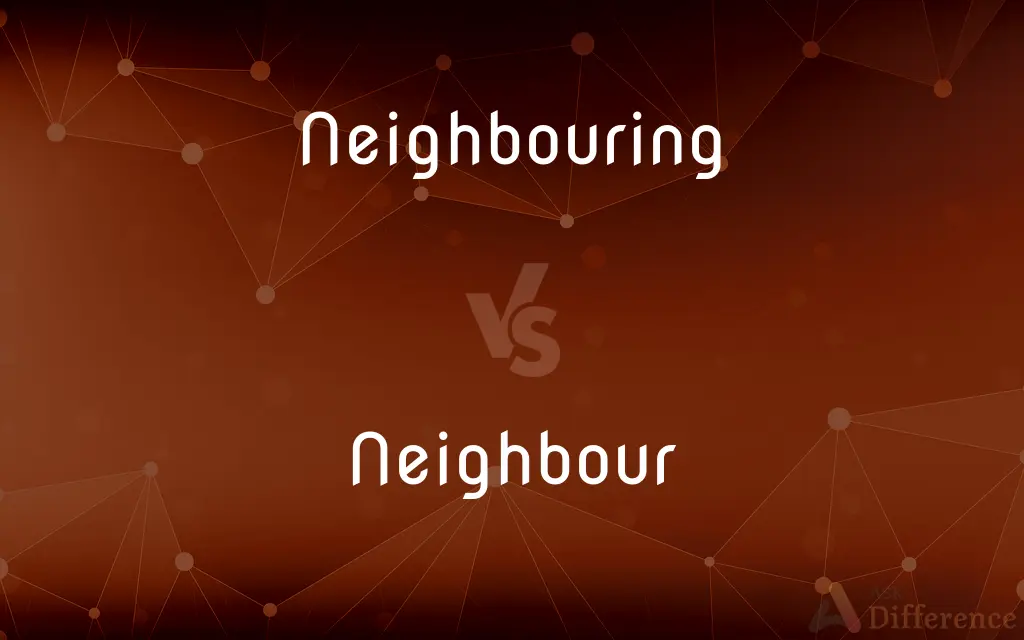Neighbouring vs. Neighbour — What's the Difference?
Edited by Tayyaba Rehman — By Maham Liaqat — Updated on March 24, 2024
"Neighbouring" describes something that is adjacent or nearby, often used to denote proximity. "Neighbour" refers to a person living near or next to another, focusing on the relationship between adjacent inhabitants.

Difference Between Neighbouring and Neighbour
Table of Contents
ADVERTISEMENT
Key Differences
"Neighbouring" is an adjective or present participle used to describe entities (places, objects, or areas) that are located close to each other. "Neighbour," on the other hand, is primarily used as a noun (but can also be an action verb in some contexts) that identifies an individual or entity residing or situated next to or very near another. In a residential context, it specifically refers to a person living in close proximity to another person.
The use of "neighbouring" can extend beyond physical proximity to imply similarity or relatedness in some aspects, such as "neighbouring topics" in a discussion or study. "Neighbour," however, often carries a sense of community or shared space, focusing on the personal or direct relationship between the entities involved. This term can invoke a sense of duty, camaraderie, or social interaction that is less commonly associated with the more general and location-focused "neighbouring."
Cultural or contextual nuances may influence the understanding and application of these terms. "Neighbouring" is neutral, describing a fact about location or proximity without implying any particular quality of relationship. Conversely, "neighbour" can suggest varying degrees of social engagement, from mere cohabitation to active participation in each other’s lives, depending on the context.
In literature and everyday language, "neighbouring" is often used to set the scene or describe settings, contributing to the background or context of a narrative. "Neighbour," however, is used to develop characters and interpersonal dynamics, playing a more central role in storytelling and communication about human relationships and interactions.
Comparison Chart
Part of Speech
Adjective, Present Participle
Noun, Verb
ADVERTISEMENT
Definition
Describes entities that are nearby or adjacent.
Refers to a person living near another.
Implication
Proximity, adjacent location
Relationship, community, proximity
Usage Context
Spatial relationships, locations
Personal relationships, direct interaction
Connotation
Neutral, location-focused
Community-focused, can imply social interaction
Compare with Definitions
Neighbouring
Pertaining to entities that are adjacent.
The development project will include the neighbouring properties.
Neighbour
Reflects a sense of belonging or community.
He felt a strong sense of duty to help his neighbours in need.
Neighbouring
Implies proximity without direct interaction.
The forest is home to several neighbouring animal species.
Neighbour
Often used in community or residential contexts.
The neighbourhood watch program was initiated by concerned neighbours.
Neighbouring
Neutral in terms of relationship quality.
The business expanded to include the neighbouring market sectors.
Neighbour
A person residing near or next to another.
She baked cookies for her new neighbour as a welcome gesture.
Neighbouring
Located next to or very close to another.
They explored the neighbouring towns during their vacation.
Neighbour
Can imply a social relationship.
Their children became best friends with the neighbours' kids.
Neighbouring
Can suggest relatedness in abstract terms.
The professor will discuss neighbouring concepts in sociology.
Neighbour
Can be a verb to describe adjacency.
The vineyard neighbours the national park.
Neighbouring
(British spelling) neighboring
Neighbour
A person living next door to or very near to the speaker or person referred to
Our garden was the envy of the neighbours
Neighbouring
(British spelling) neighboring
Neighbour
(of a place or object) be situated next to or very near (another)
The square neighbours the old quarter of the town
Neighbouring
Situated near one another;
Neighbor states
Neighbour
Variant of neighbor.
Neighbour
A person living on adjacent or nearby land; a person situated adjacently or nearby; anything (of the same type of thing as the subject) in an adjacent or nearby position.
My neighbour has two noisy cats.
They′re our neighbours across the street.
Neighbour
One who is near in sympathy or confidence.
Neighbour
(biblical) A fellow human being.
Neighbour
(transitive) To be adjacent to
Though France neighbours Germany, its culture is significantly different.
Neighbour
To be similar to, to be almost the same as.
That sort of talk is neighbouring on treason.
Neighbour
To associate intimately with; to be close to.
Neighbour
Same as neighbor, neighboring, neighborhood, neighborly.
Neighbour
A person who lives (or is located) near another
Neighbour
A nearby object of the same kind;
Fort Worth is a neighbor of Dallas
What is the closest neighbor to the Earth?
Neighbour
Live or be located as a neighbor;
The neighboring house
Neighbour
Be located near or adjacent to;
Pakistan neighbors India
Neighbour
Situated near one another;
Neighbor states
Common Curiosities
What does it mean if a house is "neighbouring"?
It means the house is located next to or very close to another house or property.
How does one become a good neighbour?
By being friendly, respectful, and helpful towards those living nearby.
Is "neighbour" used only to describe people?
Primarily, yes, but it can also describe entities or locations in close proximity as a verb.
Can countries be neighbours?
Yes, countries with adjacent borders are considered neighbouring countries.
Does "neighbouring" imply any legal obligations?
No, it describes proximity or relatedness without implying legal responsibilities.
Can a business have neighbours?
Yes, in the context of proximity to other businesses or within a community.
Can "neighbouring" refer to non-physical proximity?
Yes, it can refer to relatedness or adjacency in abstract terms, like topics or fields of study.
What's the difference between "neighbouring" and "adjacent"?
"Neighbouring" often implies nearby without sharing a boundary, while "adjacent" means next to or adjoining with a shared boundary.
What role do neighbours play in a community?
Neighbours can enhance community security, provide social support, and contribute to a friendly, cooperative living environment.
How does the concept of being neighbours differ culturally?
Cultural attitudes towards neighbours and the importance of neighbourly relationships can vary, affecting how people interact with and support each other.
Share Your Discovery

Previous Comparison
Present vs. Attend
Next Comparison
Elegance vs. BeautyAuthor Spotlight
Written by
Maham LiaqatEdited by
Tayyaba RehmanTayyaba Rehman is a distinguished writer, currently serving as a primary contributor to askdifference.com. As a researcher in semantics and etymology, Tayyaba's passion for the complexity of languages and their distinctions has found a perfect home on the platform. Tayyaba delves into the intricacies of language, distinguishing between commonly confused words and phrases, thereby providing clarity for readers worldwide.













































